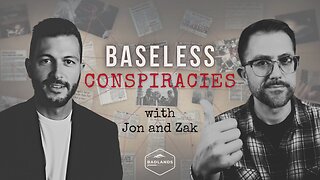Premium Only Content

Lesson 43 - Three Days and Three Nights
The Bible Show
Lesson 43: Three Days and Three Nights
03/05/2020
EvoluionPOP.com
01.) Deuteronomy 12:32 (Do not add to or take from God's commands).
02.) Revelation 22:16-20 (Do not add to or take from the book).
03.) Catholic.org
https://www.catholic.org/lent/ashwed.php
Ash Wednesday - February 26, 2020 - The first day of Lent
Ash Wednesday is one of the most popular and important holy days in the liturgical calendar. Ash Wednesday opens Lent, a season of fasting and prayer.
Ash Wednesday takes place 46 days before Easter Sunday, and is chiefly observed by Catholics, although many other Christians observe it too.
Ash Wednesday comes from the ancient Jewish tradition of penance and fasting. The practice includes the wearing of ashes on the head. The ashes symbolize the dust from which God made us. As the priest applies the ashes to a person's forehead, he speaks the words: "Remember that you are dust, and to dust you shall return."
Alternatively, the priest may speak the words, "Repent and believe in the Gospel."
Ashes also symbolize grief, in this case, grief that we have sinned and caused division from God.
Writings from the Second-century Church refer to the wearing of ashes as a sign of penance.
Priests administer ashes during Mass and all are invited to accept the ashes as a visible symbol of penance. Even non-Christians and the excommunicated are welcome to receive the ashes. The ashes are made from blessed palm branches, taken from the previous year's Palm Sunday Mass.
Ash Wednesday marks the beginning of the Season of Lent. It is a season of penance, reflection, and fasting which prepares us for Christ's Resurrection on Easter Sunday, through which we attain redemption.
03a.) Lent (not in the bible).
03b.) Liturgical calendar (God has His own calendar and Feast Days - Leviticus 23).
03c.) Easter Sunday ("Easter" in the bible is translated "Passover", there is no "Easter Sunday" in the bible).
03d.) Mass (not in the bible).
03e.) Palm Sunday (not in the bible; palm leaves were put in front of Jesus when he was placed on the donkey and it wasn't on a Sunday).
04.) TheHolidaySpot.com
https://www.theholidayspot.com/ash_wednesday/origin.htm
Ash Wednesday
Ash Wednesday marks the onset of the Lent, the 40-day period of fasting and abstinence. It is also known as the 'Day of Ashes'. So called because on that day at church the faithful have their foreheads marked with ashes in the shape of a cross.
The name 'Day of Ashes' comes from "Dies Cinerum" in the Roman Missal and is found in the earliest existing copies of the Gregorian Sacramentary. The concept originated by the Roman Catholics somewhere in the 6th century. Though the exact origin of the day is not clear, the custom of marking the head with ashes on this Day is said to have originated during the papacy of Gregory the Great (590-604).
In the Old Testament ashes were found to have used for two purposes: as a sign of humility and mortality; and as a sign of sorrow and repentance for sin. The Christian connotation for ashes in the liturgy of Ash Wednesday has also been taken from this Old Testament biblical custom.
Receiving ashes on the head as a reminder of mortality and a sign of sorrow for sin was a practice of the Anglo-Saxon church in the 10th century. It was made universal throughout the Western church at the Synod of Benevento in 1091.
Originally the use of ashes to betoken penance was a matter of private devotion. Later it became part of the official rite for reconciling public penitents. In this context, ashes on the penitent served as a motive for fellow Christians to pray for the returning sinner and to feel sympathy for him. Still later, the use of ashes passed into its present rite of beginning the penitential season of Lent on Ash Wednesday.
05.) Leviticus 23:1-3 (the seventh day is the sabbath day).
06.) Leviticus 23:4-5 (the Lord's passover).
07.) Leviticus 23:6-8 (the feast of Unleavened Bread).
08.) John 19:30-42 (Jesus is killed and buried on the preparation day before the high sabbath day).
09.) Matthew 12:38-40 (Jesus three days and three nights buried).
10.) Johah 1:1-4, 7-9, 12, 15-17 (Jonah three days and three nights in the fish).
11.) Matthew 28:1-7 (Jesus risen after three days and three nights).
12.) Passover before sundown Jesus is buried, after 3pm, and rose Saturday before Sunday morning:
Saturday before sundown = 1 day (Weekly sabbath day)
Friday after sundown = 1 night
Friday before sundown = 2 days
Thursday after sundown = 2 nights (Feast of Unleavend Bread night)
Thursday before sundown = 3 days (Feast of Unleavend Bread day)
Wednesday after sundown = 3 nights (Passover evening)
13.) John 12:1-2, 12-16 (Palms five days before Passover = Friday).
14.) Revelation 7:9-10 (A great multitude with palms).
15.) Acts 12:1-5 (Easter during days of Unleavend Bread).
16.) Strong's Bible Dictionary: Easter (G3957) - Pascha / pas'-kah; compare H6453; the Passover.
17.) AllAboutJesusChrist.org
https://www.allaboutjesuschrist.org/history-of-easter-faq.htm
History of Easter
According to Christians around the world, Easter is a day set aside to commemorate Jesus' resurrection from the dead. But the history of Easter is more complicated than that. The name of the holiday is derived from the name of an ancient, pagan goddess, Eastre, sometimes spelled Eostre. Eastre was the goddess of spring and worshipped by the Teutonic tribes that the early Christians ministered to.
At this point, the history of Easter becomes a little complicated. The early missionaries, seeking to convert the people of the Teutonic tribes, adopted the celebration of Eastre's festival as their own. Since the festival fell around the same time as the Christian's memorial of Jesus' resurrection, the missionaries simply substituted one holiday for another. This allowed the new converts to continue their tradition, but its meaning and purpose had changed.
The history of Easter continued to be complex as the actual date of the celebration was never fully established. Some linked the memorial to the ancient Hebrew calendar's celebration of Passover. Others linked the date to the spring equinox. Finally, in 325 A.D. Emperor Constantine met with other church leaders and together they decreed that Easter would fall on the first Sunday after the first full moon after the spring equinox. However, the controversy over the holiday's date continues with some the Eastern Orthodox Churches still celebrating it at the end of Passover week.
18.) 1 Corinthians 5:7-8 (Christ our Passover).
-
 13:09
13:09
Forrest Galante
1 day agoWildlife Expert Reacts To Deadly Australian Animal TikToks
70.6K13 -
 23:47
23:47
GritsGG
2 days agoThe Forgotten Best Sniper Support AR!
23.1K4 -
 10:18
10:18
The Pascal Show
15 hours ago'I WILL NOT GIVE UP ON MY BABY!' Emmanuel Haro's Mom Breaks Silence From Jail?!
32 -
 LIVE
LIVE
Lofi Girl
2 years agoSynthwave Radio 🌌 - beats to chill/game to
201 watching -
 2:33:04
2:33:04
Badlands Media
12 hours agoBaseless Conspiracies Ep. 147: Pole Shifts, Plasma Skies, and the Truth About Cataclysms
145K17 -
 4:33:42
4:33:42
Drew Hernandez
8 hours agoISRAEL BOMBS GAZA HOSPITAL ON LIVE TV KILLING AT LEAST 20 INCLUDING JOURNALISTS & CIVILIANS
17K19 -
 2:55:23
2:55:23
TimcastIRL
7 hours agoTrump Orders Specialized National Guard Units To Combat Crime In Cities, Dems Furious | Timcast IRL
196K140 -
 6:22:03
6:22:03
SpartakusLIVE
9 hours ago#1 Rocket CHAMPION of Verdansk wields UNSTOPPABLE new META
77.2K5 -
 2:55:11
2:55:11
Barry Cunningham
8 hours agoPRESIDENT TRUMP MADE TODAY A VERY BAD DAY TO BE A DEMOCRAT!
94.8K62 -
 1:15:29
1:15:29
Flyover Conservatives
1 day agoFrom Cool to Cringe: How Democrats Lost America’s Ear | FOC Show
44K13